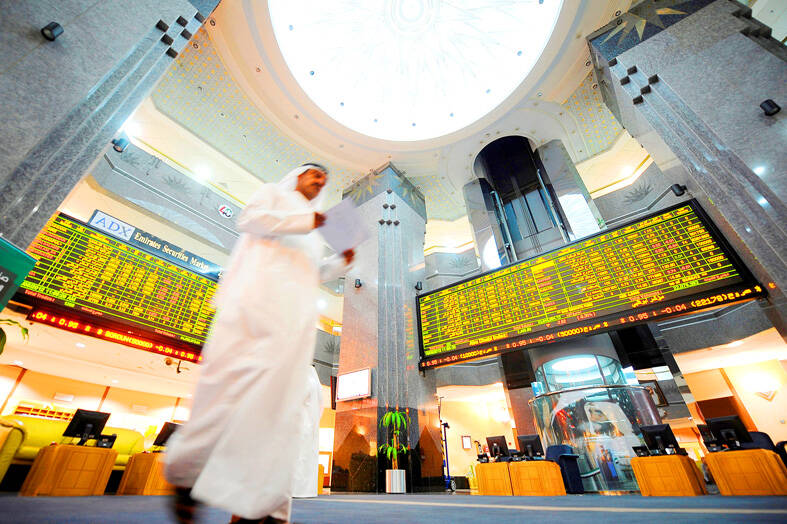The Middle Eastern operator of KFC and Pizza Hut restaurants is set for a landmark dual listing, in which Saudi Arabia’s Public Investment Fund and Mohamed Alabbar, a businessman based in Dubai, United Arab Emirates (UAE), would sell a 30 percent stake in the firm.
In the first dual listing of its kind, Americana Restaurants International PLC’s owners would offer 2.53 billion shares in Riyadh and Abu Dhabi, they said yesterday.
The initial public offering (IPO) could raise at least US$2 billion, which would make it Saudi Arabia’s biggest listing this year, people familiar with the matter said.

Photo: REUTERS
Final details are still under discussion and might change, the people said.
A representative for Americana declined to comment.
The firm would be the first to have shares traded in Abu Dhabi and Saudi Arabia, where the Tadawul exchange has for years been encouraging firms to dual list.
The offer period would run from Nov. 14 to Nov. 21 for retail investors in the UAE and Saudi Arabia, and until Nov. 22 for institutional investors.
Trading on the two exchanges would start on Dec. 6
Americana is targeting a partial dividend distribution of about 75 percent of net profit attributable to the parent firms for the six months to Dec. 31.
The company would pay an annual dividend from next year, and said it plans to distribute a minimum of 50 percent of net profit.
The listing is part of a late-year rush of IPOs in the Middle East even as markets worldwide are hit by inflation fears and the risk of an economic slowdown. A surge in oil prices at the start of this year, as well as increased investor inflows, led to a flurry of listings in the Persian Gulf, which notched up its best first half of a year on a record for stock market debuts.
Americana operates restaurants for brands including Baskin Robbins, Costa Coffee and TGI Fridays, as well as KFC and Pizza Hut, its Web site says.
It was previously operated by Kuwait Food Co under the wider Americana umbrella, which included the restaurant and food businesses.
The IPO is for the restaurant business only.
The firm reported revenue of US$2.05 billion for the year ended December last year, and net profit of US$204 million.
Alabbar’s Adeptio AD Investments SPC Ltd bought the firm in 2016. The Public Investment Fund took a 50 percent stake in Adeptio at the end of that year, and Americana subsequently delisted from the Kuwait stock exchange.

Sweeping policy changes under US Secretary of Health and Human Services Robert F. Kennedy Jr are having a chilling effect on vaccine makers as anti-vaccine rhetoric has turned into concrete changes in inoculation schedules and recommendations, investors and executives said. The administration of US President Donald Trump has in the past year upended vaccine recommendations, with the country last month ending its longstanding guidance that all children receive inoculations against flu, hepatitis A and other diseases. The unprecedented changes have led to diminished vaccine usage, hurt the investment case for some biotechs, and created a drag that would likely dent revenues and

Macronix International Co (旺宏), the world’s biggest NOR flash memory supplier, yesterday said it would spend NT$22 billion (US$699.1 million) on capacity expansion this year to increase its production of mid-to-low-density memory chips as the world’s major memorychip suppliers are phasing out the market. The company said its planned capital expenditures are about 11 times higher than the NT$1.8 billion it spent on new facilities and equipment last year. A majority of this year’s outlay would be allocated to step up capacity of multi-level cell (MLC) NAND flash memory chips, which are used in embedded multimedia cards (eMMC), a managed

CULPRITS: Factors that affected the slip included falling global crude oil prices, wait-and-see consumer attitudes due to US tariffs and a different Lunar New Year holiday schedule Taiwan’s retail sales ended a nine-year growth streak last year, slipping 0.2 percent from a year earlier as uncertainty over US tariff policies affected demand for durable goods, data released on Friday by the Ministry of Economic Affairs showed. Last year’s retail sales totaled NT$4.84 trillion (US$153.27 billion), down about NT$9.5 billion, or 0.2 percent, from 2024. Despite the decline, the figure was still the second-highest annual sales total on record. Ministry statistics department deputy head Chen Yu-fang (陳玉芳) said sales of cars, motorcycles and related products, which accounted for 17.4 percent of total retail rales last year, fell NT$68.1 billion, or

In the wake of strong global demand for AI applications, Taiwan’s export-oriented economy accelerated with the composite index of economic indicators flashing the first “red” light in December for one year, indicating the economy is in booming mode, the National Development Council (NDC) said yesterday. Moreover, the index of leading indicators, which gauges the potential state of the economy over the next six months, also moved higher in December amid growing optimism over the outlook, the NDC said. In December, the index of economic indicators rose one point from a month earlier to 38, at the lower end of the “red” light.